The back of the back was cool, and when I found that someone really stared at me. Is this a sense of mind?
Author:Shell net Time:2022.09.24
Have you ever experienced such an experience? I feel that someone stares at you behind. You look back and really connect with someone.
Is it a coincidence? Or do we humans really evolve a "can feel the eyes of others"?
Can't feel ... right?
In 1898, British psychologist Edward Titchener, for the first time, published a thesis in the journal of Science [1] describing this phenomenon (the Science of the year was really easy to post).
Tiqinner found that some of the college students he taught firmly believed that he could "feel" someone staring at them behind -a focus of attention would cast a kind of pressure on the neck, and sometimes a sense of tension or stiffness on the back of the neck. Sometimes There is also a slightly painful acupuncture feeling. This feeling is getting stronger and stronger, and the range becomes bigger and bigger, until people have to turn around to see who is staring at themselves.

Who stared at me? | Giphy
However, after Tiqinner did some simple experiments, it was not that it was not "feeling" because of "staring". The whole process is more like a prophecy of self -realization.
① When there is someone behind, people are anxious because they are worried about how to think of themselves. " This anxiety makes people feel uncomfortable. And once people focus on a certain part of the body, such as the back of the neck, it is easier to enlarge the original weak feeling.
Tiqinner gave an example. He had a friend to learn to dance. Every time he needed to face the coach (even a private coach), he made him uncomfortable. When he was standing behind the coach, he knew that the coach could not see himself. , I feel relaxed.
② When people think that "someone is watching me", it may have more movements, such as the back of the neck, reaching out to touch the uncomfortable part, and turn around and look behind. These actions will attract the attention of others.
In other words, someone is not a coincidence when turning around, but the cause and effect need to be reversed.
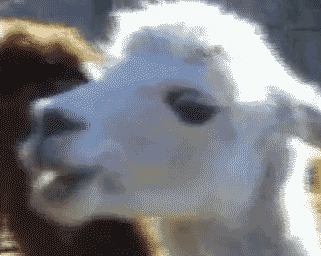
Turn around and find someone staring at you | giphy
Not because someone looks at you, you feel uncomfortable; but because you feel uncomfortable, have a lot of movements, and even turn around, it has caused others to see you. It takes about 1 second to turn your head, and the person behind you turned to stare at you only take about 0.2 seconds.
In 1913, another related study was published in the American Psychological Journal [2]. John Coover, a psychologist at Stanford University, came up with a good way -to randomly determine when to "stare" by rolling the dice. ; If the dice is even, he will not stare at that person. Before the beginning, Kufo knocked with a pencil with a pencil. At the end, he knocked 2 times with a pencil. And the "staring" back to Kufo needs to guess whether he was stared at this period.
As a result, 10 people guess 100 times per person, a total of 1,000 times, and the accuracy rate of guess is only 50.2%, which is no different from guessing. Kufo's research once again shows that people cannot correctly judge "when someone is staring at themselves."
It seems that there is already a conclusion, but things are not completely ended.
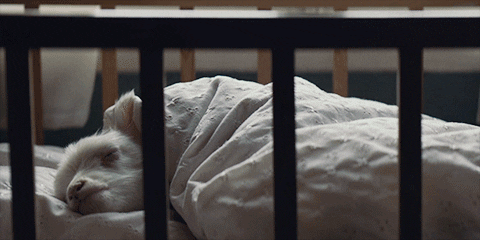
From the study of Kufo, people cannot correctly judge "when someone is staring at themselves" | giphy
Did you feel the subconscious?
Someone put forward another possibility and felt it, but only stayed at the subconscious step, and could not be determined correctly.
In 1993, William Braud improved the study [3] [4]. He feels that people may be too nervous when they are researched, and they are uncertain in their hearts, so they ignore the subtle signals received. As a result, Blaud was inspired by the polygraph, and some electrode sensors were tied to the experimenters to record the physiological signal fluctuations appearing on the experiments. He chose to measure the Electrodermal Activity (EDA). Skin electrical activity is related to emotions and is not controlled by consciousness.
Braord also completely separated the "staring" and "staring". The two sat in different rooms and performed "remote staring" through monitoring the camera.
The people who stares must perform 10 "staring", plus 10 "not staring", each time it lasts 30 seconds, and the order is random.
And the starer does not need to do anything, you don't need to guess if he has been stared at, as long as you sit there to let the instrument record his physiological signal.
As a result, it was shocking that "really staring" is significantly related to "strong wake -up of skin electrical activities". The two were in different rooms, just "see" through the camera.

Before being stared, the body has a reaction | Giphy
Can this experimental result be repeated?
Interestingly, whether it can be repeated, it is related to the background of the researcher's own. Belief is spiritual, but it is not spiritual if you don't believe it. People from super psychology (research supernatural phenomena) research institutes are more likely to repeat this result. And psychologists who have suspicion theory themselves often come to the conclusion of "no effect".
In 2004, researchers in the United States and Germany published a review on the British Journal of Psychology [5]. They collected 40 related studies between 1977 and 2000, eliminated 4 studies that were not good enough for good quality. Later, the remaining 36 studies were based on the quality weighted analysis of the research quality, and the conclusion that "long -distance gaze" can cause some physiological reactions. However, if only 7 studies are comprehensive analysis of the best quality, it shows that "long -distance gaze" does not have any effect. This summary believes that it cannot be concluded at present, and more high -quality research in the future is needed.
Why is there a sense of view?
Whether the "sense of vision" is the true feeling of the external environment or the illusion of the spontaneous occurrence of the brain, it can be explained by evolutionary theory.
Many people mention the feeling of watching animals or being stared at by animals. Pet owners often feel stared at by their own cats and dogs. Some wild animal photographers believe that even if they observe animals through telescopes, animals will notice it.
"I'm staring!" | Giphy
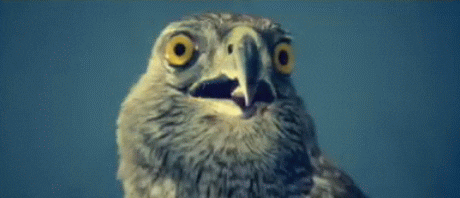
William J. Long once wrote the feeling of sitting alone in the forest when he was young: "I often have this" something to look at me '. When you don't see anything, this feeling will appear. When I look around, I almost always find some birds, foxes or squirrels. They may find me turn around, so they quietly approach me and watch me curiously. . "[6]
In terms of evolution, this feeling has some benefits.
When we think that we are staring at beasts, we may be more cautious, light hands and feet, maintain alertness and conceal ourselves, thereby reducing the risks of our predators and increasing our survival rate in the jungle.
But if the "eyes" is not a real mind, but an illusion, why does this illusion exist?
And there are many people with this illusion. Kufo was investigated in Stanford University students that year. 68%of the 146 students in one course had this "stare", and 85%of the 95 people in the other class were equally. There is such a sense of "sting."
Similarly, this illusion has some benefits in evolution.
When we think we are watching, we are more likely to follow the rules and abide by the laws and moral norms of the passage of society. And these good behaviors make it easier for us to be accepted by the society and will not be deported collectively, thereby increasing our survival rate in the collective.
Although being stared at it may be an illusion, it will make us more rules | Giphy
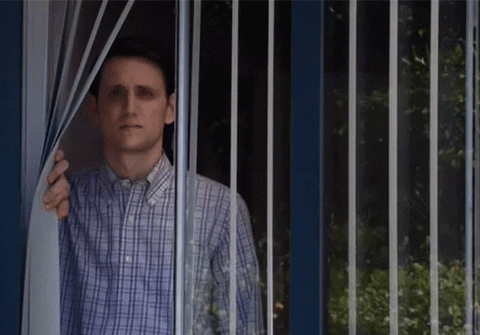
But this illusion may also cause trouble.
Psychological researchers have proposed the "Spotlight Effect" [7] and "Sinister Attribution Error" [8].
The "magnesium light effect" refers to the chances of people who always overestimate their behavior or appearance by others, and also overestimate their influence on their remarks on others. In our world, we are the absolute protagonist, but in the world of others, we are just an inconspicuous person in the background -however, we can easily forget this.
"Malicious attribution bias" refers to that when people feel that they are always in the supervision and evaluation of others, they will overestimate their chances of being paid attention to by others, and therefore tend to think that others' behavior is "wrong to others. "Things are targeting me." For example, colleagues do not say hello to themselves, maybe because colleagues are annoying for work, or they simply not notice themselves, but those who "malicious attribution bias" always think that this is definitely because colleagues have to have themselves to themselves to themselves. Opinion.
These two prejudices will not only make us easier to feel that "someone is watching me", but also makes us feel that this gaze may not be good at it.
These two prejudices may make us feel that others are staring at us.

Conclusion
Maybe you can find a partner next time and try to do this experiment yourself.
Regardless of the results, you will have a better understanding of the scientific research process.
Just like the ending of the papers in 1898- ——
"In short, I have tested this" staring "in different times and different experiments. These experimental objects either declare that I can perceive the staring, or claim that I can" stare at others to make them stare. Turn around uncomfortable. "The experiments are always given negative results for this perception or ability.
... If scientific readers believe that this result is completely foreseeable, and experimental time is a waste of time. I can only answer that in my opinion, it is meaningful to break the widespread superstition in the public. None of the psychologists with scientific minds will believe in the mind. At the same time, it may drive a student to start on the correct scientific path. Therefore, the time spent, it may get a hundred times return in the future science. "
references
[1] Titchener, e. B. (1898). The'feeling of being stared at '. Science, 8 (208), 895-897.
[2] COOVER, J. E. (1913). "The Feeling of Being Stared at": Experimental. The American Journal of Psychology, 24 (4), 570-575.
[3]Braud, W. G., Shafer, D., Andrews, S. (1993). Further studies of autonomic detection of remote staring, new control procedures, and personality correlates. Journal of Parapsychology, 57, 391 – 409.
[4]Braud, W. G., Shafer, D., Andrews, S. (1993). Reactions to an unseen gaze (remote attention): A review, with new data on autonomic staring detection. Journal of Parapsychology, 57, 373 – 390 Then, then, then
[5] Schmidt, S., SCHNEIDER, R., UTTS, J., Walach, H. (2004). Distant IntentificationAlity and the Feeling of Being Stared at: Two Meta‐analyses. British Journal of Psychology, 95, 95 , 235-247.
[6] Sheldrake, R. (2005). The sense of betening stared at-PART 1: is it real or Illusory ?. Journal of consciousness Studies, 12 (6), 10-31..
[7]Gilovich, T., Medvec, V. H., Savitsky, K. (2000). The spotlight effect in social judgment: an egocentric bias in estimates of the salience of one's own actions and appearance. Journal of personality and social psychology, 78 (2), 211.
[8] Kramer, R. M. (1994). The Sinister Attribution error: Paranoid Cognition and Collective Distance in Organization. Motivation and Emotion, 18 (2), 199-230.
[9] Waytz, a. (2013). The feeling of being stared at. Retrieve from https://blogs.scientificAmerican.com/moral-dhe- -ted-stared-stared-t-styled-at -T
[10] Psychic Staring Effect -Wikipedia. Retrieved fromhttps: //en.wikipedia.org/wiki/psychic_staring_effect_effect
Author: You Zhixuan
Edit: Little towel
- END -
"Star Chain Second Generation", the threat to us?
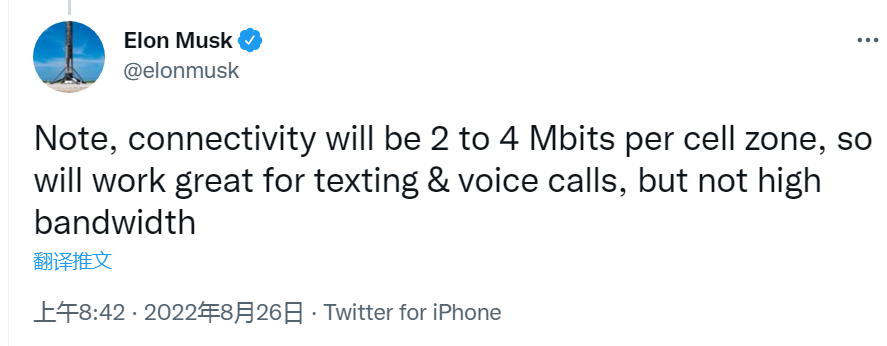
Imagine that a traveler was lost in an unmanned area and there was no signal base ...
Hefei Liangzi City Network is expected to expand to four counties and cities
On the afternoon of September 6, 2022 National Cyber Security Weekly Weekly Safety Sub -Forum was held in Hefei, Anhui. Focusing on how to further integrate classic information security and quantu...